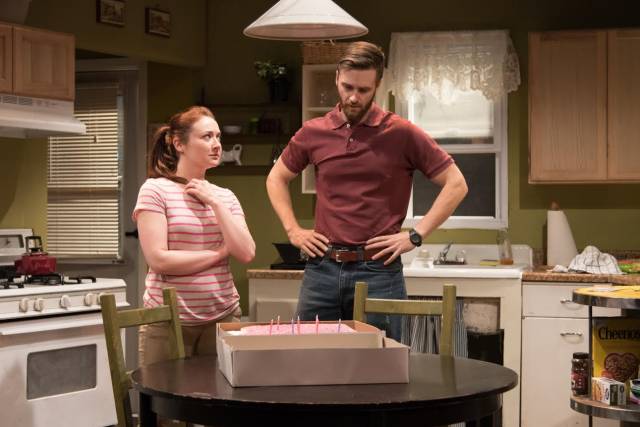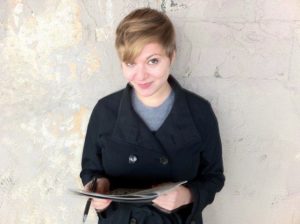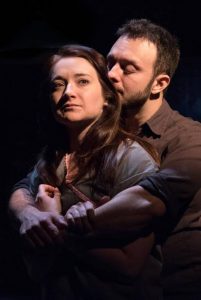

At first, Utility, Emily Schwend’s new play with the Amoralists now onstage at Rattlestick Playwrights Theater, doesn’t feel particularly earthshaking. There are no explosions, no fits of sobbing or knockdown, drag-out fights. The play creeps along quietly in the roughly 24 hours leading up to the birthday party that working mom Amber is planning to throw for her daughter.
But when you look closer, when you sit in Rattlestick’s almost embarrassingly intimate space (be warned, you may accidentally land in a stranger’s lap as you shimmy your way to your seat) and live with her characters, a dark, vivid reality opens up. Small disasters rise like mountains—the birthday cake falls to the floor, Amber has to make due with a secondhand bike as a gift, and most importantly, her on-again, off-again partner, Chris, can’t be counted on for much at all—he can’t even keep the lights on.
I spoke with Schwend about working with a theater troupe, developing the play’s most personal moments, and giving life to a new world on the stage.
Can you talk a little bit about working with the Amoralists?
Well this is my third production in New York and my first show Jay [Stull] also directed, and while it wasn't under the umbrella of the Amoralists, it had a very Amoralist feel to it. They're a very scrappy group, they get their hands dirty. Everyone has a lot of passion which is really great when you're working on a small production that requires a lot of creativity and problem solving, and you have a little budget to figure out how to make something work, which is something I appreciate because I work similarly and it makes it fun to take risks even though it's scary, because I feel like it's kind of a risky play.

Can you expand a bit on that? What do you mean when you say risky?
It's a departure for the Amoralists' aesthetic, so I know for them, well for James [Kautz, Co-Founder and Artistic Director of the Amoralists], while it fits within their aesthetic, it is very different than their other plays. For me it's risky -- it's structurally risky for me, the way the play is written. The small moments that for me create the drama of the piece kind of take left turns from what you might think when you first start watching it. Which is risky [when] you're not sure how [the audience] will receive it or what they're prepped to be watching. But we all love this play, and I know that James especially really fell in love with this script and wanted to do it as part of his company as opposed to just helping me get it produced elsewhere.
You touched on a question I have, which is that in some ways there's no big, dramatic story arc - it's about the small moments. Can you talk about how moments like that work in the play?
Well, it's interesting, I actually think that maybe for people watching this play, or many of them, the moments of drama that feel very small -- like early in the play, [Amber] drops her daughter's birthday cake on the floor in the box -- for many people this would be an inconvenience, we could go get another one, it would be like, "Oh great, I'm out 40, 50 dollars." But for this woman that's a huge catastrophe because there is no backup plan. The point of this play is to show that for somebody in financial circumstances that don't allow for a lot of room, small mistakes can add up to have huge consequences. So in the play when the lights go out because of a misunderstanding or a mistake or an accident, whatever you want to call it, it isn't as simple as, "Well, we'll call them in the morning" or "We'll go pay off the bill," it's suddenly this huge wrench in their entire lives and they have to figure out: "Well now what do we do?" It's why a lot of the play shows how carefully Amber has arranged her life and organized it down to the minutia, because one setback is like hitting the first domino.
So in certain ways, Chris is less of a positive force and more a wrench in her carefully planned life.
Right, he's unreliable, and she doesn't have room for unreliability.
I was moved by the way that the play allows certain acts to play out in real time, whether she's wrapping presents or smoking a cigarette, can you talk a bit about how those actions function in the play?
Well, Jay and I talk about this often, with many of my plays and not just this one. We both enjoy playing with time and with being present with characters. I think when you're watching this play and actions are unfolding in realistic time, like you said, there's a rhythm to that that I really enjoy writing and I enjoy watching as well. It's like an act of witnessing, and that's being present with a character. It's not a performative act of "we're gonna wrap a couple of presents and that'll tell us, oh, it's the birthday party." It's not that telling of the action, it's about existing with somebody in a space and time that I enjoy. It requires patience. It's like a study in behavior as opposed to a study in action.
You talk about the ways you want to impact the audience, such as having us sit with your characters in these small moments. What did you want to leave the audience with? Do you think the play is hopeful in the end?
It's interesting, we've only had a handful of performances already, but people leave feeling very differently about this play. I don't like to be prescriptive in how someone needs to perceive my work or receive this play in particular, which does have some ambiguity in terms of response. I can tell you how I feel. I feel like by the end of this play Amber is given some agency, and I feel hopeful for her despite the relentless tiny avalanches of trouble that she experiences throughout the play. I feel for hopeful for her, and I don't know what that means about what her future will look like, but I feel like she has achieved a certain level of self-identity that is in and of itself a powerful tool for her -- to move forward in her life with confidence, to move forward in her life with more happiness.

Perhaps Jim, Chris' brother in the play, offers a bit of hope as an alternative to Chris?
I don't see it that way. There's a lot of speculation when the play ends: "Oh is he in love with her? Are they going to run off together?" I never think of it that way. I think Jim provides someone who understands her and can truly see her, and the importance of being seen when you feel like you've lost a lot of yourself to just being this vessel for other people -- she's a mother and a wife and a working woman, but that's not really who she is. And being given the gift of being seen, of seeing the real her -- I think that's what that moment is about for me. I don't think they're ever going to talk about it again (laughs) I think that's it.
So it doesn't have to be attached to romance. That doesn't have to be the escape -- it's something bigger.
Right, I mean I think it's romantic in the sense that you divorce it from love. It's a very vulnerable thing, and sometimes we conflate those two -- it's somebody really showing his hand even though he wants nothing from her. I don't think he has any agency when he delivers that speech to her, I don't think he wants anything back, I think he's just saying to her, "Well, you're saying all this stuff about how you've lost your way and lost yourself, but I still see you. Whatever that's worth to you, take it." And that's worth a lot to her.
You're worked with a lot of high profile theaters in a variety of locations -- how has Rattlestick been unique?
I think every experience you have anywhere is unique and different to all the others. Rattlestick has been a dream because we got to rehearse in the space as well, and it's such an intimate theater. It has a very specific feel to it. Being in that space for so long I think helped all of us -- it's a play that also requires that you feel very at home in the space and the actors feel like they've been in that space for years and years and years, that they know where everything is, that it's like secondhand to them. Because we spent six weeks in the space now, it's been really helpful to create that feel of them being there for decades.
Did six weeks feel like an adequate amount of time?
Because I've worked with Jay and James before, and they have experience with a couple of the other actors, we have kind of a shorthand which makes it a lot easier to progress quickly. Especially Jay and I. Jay and I work together all the time, and he has a hand in almost everything I do these days, even dramaturgy from the first draft, for plays that he's not even directing. So he and I don't need to have a lot of debriefing afterwards, we're usually on the same page, and we work very similarly, which makes this thing very easy.
I'd work with him all the time, on everything.
Is there anything else you'd like to tell our readers?
I'm always curious what people have to say afterwards, because it's a play that impacts people differently and people are following different elements of the story closely, and I always find that fascinating, to find what people bring to the play.
Performances of "Utility" continue through February 20.